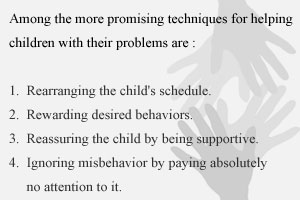
|
Why work on Parenting ?
Why ask for help, all children have problems
and they grow out of it ?
It is generally recognized that all children go through periods of emotional and
behavior difficulty. Although common, the problems of normal children should not
be considered unimportant by parents and therefore left to self-resolution. These
problems need to be confronted and effectively resolved since neglect or mismanagement
can lead to more serious difficulties.
A large cross-section of parents tend to
find rationalizations for avoiding taking any action when their child has a behavior
problem.
|
The most common rationalizations are:
- The problem is being exaggerated and is actually much milder than the person who is pressuring the parents to seek help believes it to be.
- It will go away with time.
- Taking actions might in some way damage the child's sensitive nature or paradoxically make matters worse by "making the child think about it more."
- The child "by nature" is destined to have the
problem and nothing can be done.
|
The research indicates that when parents are concerned about a serious behavior
problem in their children, they are most likely to turn to their extended family
for advice and assistance. The second most frequent source of help they look to
is health professionals, school counselors, family doctors. There is a growing body
of evidence indicating that parents, with a little guidance from professionals,
can successfully resolve a number of problem behaviors in their children.
|
|

|
WARNING SIGNS:
There are certain signs to look for which indicate that a child is experiencing serious psychological difficulties:
- Prolonged, constant anxiety, apprehension, or fear which is not proper¬tionate to
reality.
- Signs of depression, such as a growing apathy and withdrawal from people.
- An abrupt change in a child's mood or behavior so that he just does not seem to be himself anymore. For example, a very considerate and reliable child suddenly
acts irresponsibly, self-preoccupied, and hostile to others.
- Sleep disturbances, such as sleeping too much, not being able to sleep enough, restless
or nightmarish sleep, not being able to get to sleep, or waking up early.
- Appetite disturbances, including loss of appetite, gain of weight due to excessive
eating, or eating bizarre substances such as dirt or garbage.
- Disturbances in sexual functioning, such as promiscuity, exposing oneself, or excessive
masturbation.
Unfortunately, a great deal of useful information, whether
from the scientific literature or from the experiences of other parents, is not
received by parents. Some child-rearing techniques for specific problems are potentially
more effective than others, although much more research is needed.
|
|

|
Since all children are individuals, there is no universal or simple formula for resolving their complex behavior problems. It seems wise, then, for parents to become
skilled in a number of the more effective ways of helping children. In this way they are likely to increase the probability of their finding the approach that works
best for their particular child. In light of the above fact in most of my parenting workshops I design the pragmatic rather than dogmatic orientation and present several
different ways to solve each childhood problem. We need to keep learning, keep exploring and keep telling our children while they are growing up ....
‘I am there for you’
‘I believe in you !'
"I know you are special and others would see that too."
|
|
|